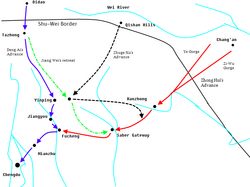Conquest of Shu by Wei
| Conquest of Shu by Wei | |||||||
|---|---|---|---|---|---|---|---|
| Part of the wars of the Three Kingdoms period | |||||||
 |
|||||||
|
|||||||
| Belligerents | |||||||
| Cao Wei | Shu Han | ||||||
| Commanders and leaders | |||||||
|
Sima Zhao Zhong Hui Deng Ai Zhuge Xu |
Liu Shan Jiang Wei Zhuge Zhan † |
||||||
| Strength | |||||||
| 180,000 | 142,000+ | ||||||
| Conquest of Shu by Wei | |||||||
| Traditional Chinese | 魏滅蜀之戰 | ||||||
|---|---|---|---|---|---|---|---|
| Simplified Chinese | 魏灭蜀之战 | ||||||
|
|||||||
| Transcriptions | |
|---|---|
| Standard Mandarin | |
| Hanyu Pinyin | Wèi Miè Shǔ Zhī Zhàn |
The Conquest of Shu by Wei was a military campaign launched by the state of Cao Wei against its rival Shu Han in 263 during the Three Kingdoms period of Chinese history. The campaign culminated in the fall of Shu and the tripartite equilibrium maintained in China for over 40 years since the end of the Han Dynasty in 220. The conquest signified the beginning of a reunified China under the Jin Dynasty.
At that time, three contending states were established after the collapse of the 400-year-old Han Dynasty in 220. Among the three, Cao Wei in the north was the dominant military power in terms of economic resources, manpower, and geographic size, suppressing Shu Han in the southwest and Eastern Wu in the southeast. Noting this, Shu chancellor Zhuge Liang initiated an alliance between Shu and Wu to counter Wei's supremacy, and began a series of ill-fated attempts to capture the Wei capital from 228 until Zhuge's death in 234. Zhuge Liang's protege Jiang Wei had his own Northern Expeditions from 247 to 262. Jiang Wei's attempts were even more hurtful to Shu than those of Zhuge Liang, and were criticized by both contemporaries and later historians as wastes of men and resources. These campaigns strained the already disadvantaged Shu, while its incapable emperor Liu Shan indulged in pleasures and neglected state affairs.
Meanwhile, in Wei, the Sima clan, through years of political maneuvering, had ousted the imperial family from power and reduced the roles of the Wei emperors to mere figureheads. The Wei regent and de facto ruler, Sima Zhao, believed that a successful military campaign to reunify China would bolster his prestige and convince the imperial court that the Mandate of Heaven had fallen on the Sima family, which would minimize the opposition for a formal succession. Disturbed by Jiang Wei's constant harassments on the Wei border and aware of Shu's internal decay, Sima Zhao decided that the conquest of Shu would be a vital step in unifying All Under Heaven.
...
Wikipedia
